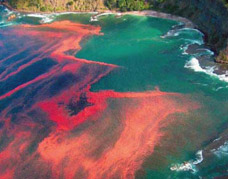Research Themes > Coastal pollution monitoring and hazards |
 |
Pollution
Human activities place significant stress on coastal ecosystems. Toxic contaminants and excessive levels of nutrients are released into coastal waters directly or via long-range atmospheric and oceanic pathways. Excessive input of nutrients in coastal waters causes unwanted algal growth, oxygen depletion, and altered food chains or species composition. One of the primary ways IOM addresses pollution is through the National River Conservation Programme of the Ministry of Environment and Forests, Government of India, through which IOM conducts long-term monitoring of pollutants and contaminants in the major waterways and sewage treatment plants. The program also documents the nature and severity of the effects associated with coastal ecosystems. The study also includes quantifying the concentration of heavy metals and pesticide residues. In addition, IOM also has other studies examining the effects of multiple stressors from human activities on natural systems. Ecosystem scale studies are being undertaken to quantify ecosystem responses to multiple stressors with several indicators being developed to assess the health and sustainability of the coastal wetlands when subject to varying degrees of nutrient inputs. |
Current Projects |
|
Completed Projects |
|
|
|
|
|
|
|
|
-
Collection and analysis for various chemical,biological and water quality parameters of ooranis of Ramanathapuram, M/s DHI Water & Environment Pvt.Ltd.,New Delhi.
|
|
|
|
| |
